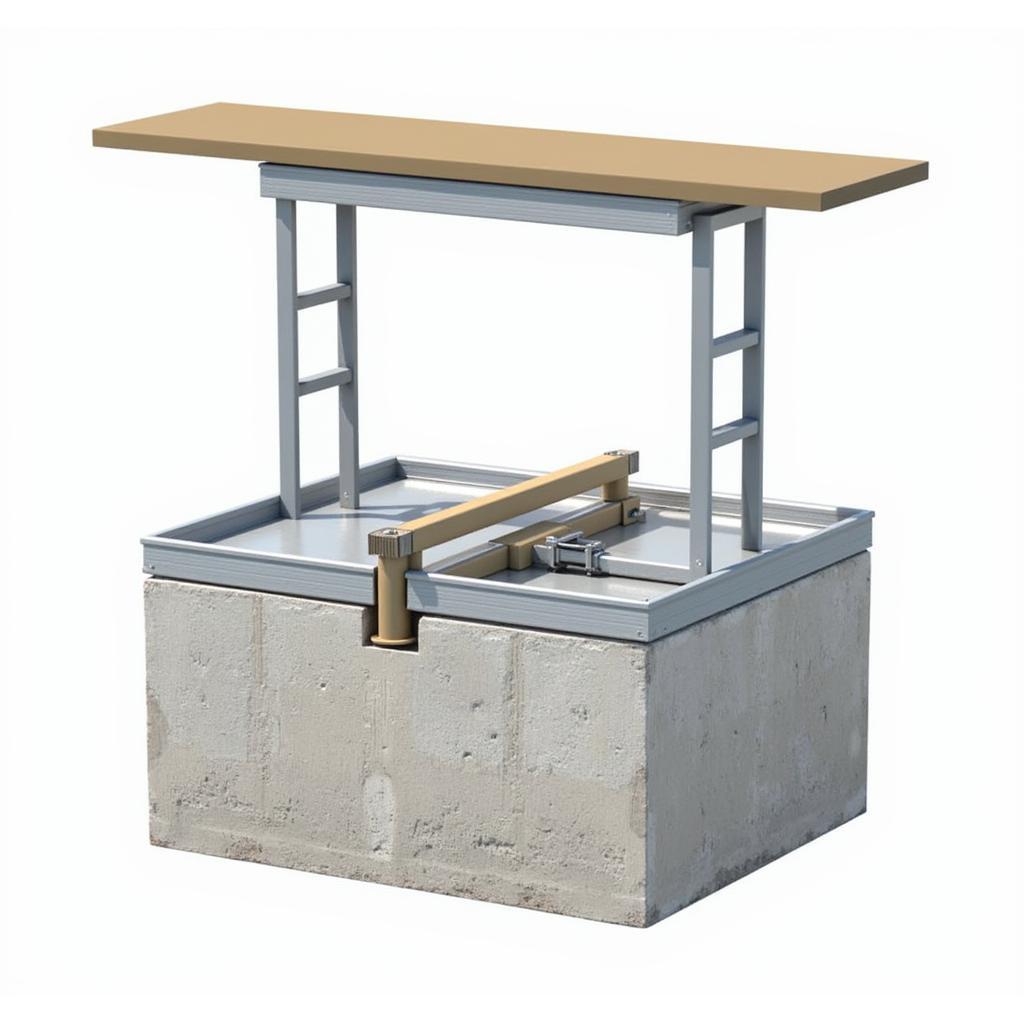Base for Diving Board: A Foundation for Thrills
December 21, 2024A base for a diving board is crucial for safety and performance. It provides the necessary support and stability for divers to launch themselves into the air. Whether you’re a seasoned diver or just starting, understanding the importance of a solid base for your diving board is essential.  Solid Diving Board Base Construction
Solid Diving Board Base Construction
Choosing the Right Base for Diving Board
Selecting the appropriate base for your diving board hinges on several key factors: the type of diving board, the height of the board, and the overall environment. A flimsy base can lead to wobbles and instability, compromising a diver’s performance and even posing safety risks. A sturdy, well-constructed base, on the other hand, ensures a smooth, controlled take-off, allowing the diver to execute their dives with confidence and precision.
For example, a concrete base is often preferred for permanent installations due to its durability and resistance to weathering. Other options include composite materials and specialized anchoring systems, each designed to accommodate different diving board setups and environmental conditions.
Considering the Diving Environment
The environment plays a significant role in determining the right base for a diving board. Is it for a backyard pool, a competitive diving facility, or a natural body of water? Each setting presents unique challenges and requires careful consideration. For instance, a diving board installed near the ocean must be able to withstand the corrosive effects of saltwater. Similarly, a diving board base in a public pool needs to be designed for heavy use and frequent exposure to chemicals.
Installing and Maintaining Your Diving Board Base
Proper installation is crucial to guarantee the long-term stability and safety of your diving board. The base should be securely anchored to a solid foundation, and the diving board itself must be attached correctly to the base. Regular maintenance is also essential. This includes inspecting the base for any signs of damage or wear, tightening bolts, and ensuring all components are functioning correctly. Neglecting maintenance can lead to serious safety hazards.
Ensuring Longevity and Safety
Investing in a high-quality base for your diving board and following proper installation and maintenance procedures is a worthwhile investment in safety and longevity. A well-maintained diving board base not only ensures the safety of the divers but also extends the lifespan of the diving board itself, providing years of enjoyment and thrilling dives.
holy cross sports message board
What Makes a Good Diving Board Base?
A good diving board base needs to be strong, stable, and durable. It should be able to withstand the forces exerted by divers, as well as the elements. Key features include:
- Strong Materials: High-quality concrete, composite materials, or other robust materials should be used.
- Secure Anchoring: The base should be firmly anchored to a solid foundation to prevent movement or instability.
- Proper Design: The base should be designed specifically for the type and size of the diving board it supports.
- Corrosion Resistance: For installations near saltwater or in chemically treated pools, corrosion resistance is vital.
Conclusion: Building a Solid Foundation for Diving Success
The base for a diving board is much more than just a supporting structure; it’s the foundation upon which thrilling dives are built. By choosing the right base, installing it correctly, and maintaining it diligently, you can ensure the safety and enjoyment of divers for years to come. A strong and stable base for your diving board is an investment in both performance and peace of mind.
FAQ
- What is the most common type of diving board base? Concrete is often the preferred choice due to its durability.
- How often should I inspect my diving board base? At least once a year, or more frequently if it’s in a high-use environment.
- Can I install a diving board base myself? It’s recommended to hire a professional for proper installation.
- What are the signs of a damaged diving board base? Cracks, rust, loose bolts, and wobbling are all signs of potential problems.
- How can I protect my diving board base from corrosion? Choose corrosion-resistant materials and apply protective coatings as needed.
- What are the different types of diving board bases available? Concrete, composite, and portable bases are common options.
- What should I consider when choosing a diving board base? Consider the type of diving board, height, and environment.
Need support? Contact us 24/7: Phone: 0915117113, Email: [email protected]. Or visit us: Tổ 3 Kp Bình An, Phú Thương, Việt Nam, Bình Phước 830000, Việt Nam.